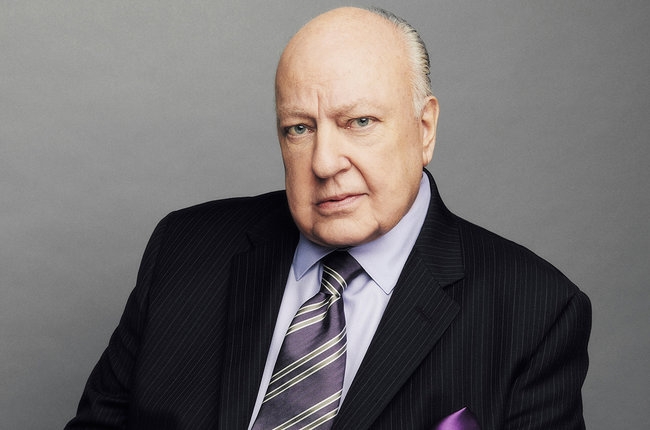Roger Ailes, who as a political consultant helped elect Republican presidents Richard Nixon, Ronald Reagan and George H.W. Bush before joining Rupert Murdoch’s empire as the hard-charging founding CEO of the Fox News Channel, a conservative counterweight to what perceived was a liberally biased mainstream media, has died, his former network Fox News announced Thursday. He was 77.
Ailes resigned as CEO of Fox News in the wake of numerous sexual harassment allegations last summer.
Ailes wielded outsized power in U.S. politics and culture. He introduced the populace to Sean Hannity, Bill O’Reilly, Megyn Kelly and other right-leaning hosts who drew massive audiences and, in doing so, became a notorious figure among progressive activists eager to discredit him and his top-rated network.
Ailes was an NBC executive who ran CNBC in the 1990s before Murdoch hired him to launch Fox News in 1996 to a mere 17 million cable homes. Conservatives embraced the upstart news network, and within a decade it was routinely drawing more viewers than competitors CNN and MSNBC — combined.
In recent years, Fox News has earned more than $1 billion annually as the most profitable asset at Murdoch’s 21st Century Fox conglomerate.
Ailes described Fox News as “real journalism,” “fair and balanced” and, more recently, with the phrase, “we report, you decide,” and the marketing slogans were an endless source of both frustration and amusement to his left-leaning detractors, some of whom delighted in calling his creation “Faux News” or other derisive derivatives.
Ailes, who never gave an inch of satisfaction to his enemies or competitors, was fiercely protective of the Fox News brand, once even suing comedian (and future U.S. senator) Al Franken for copyright infringement over Franken’s 2003 book, Lies and the Lying Liars Who Tell Them: A Fair and Balanced Look at the Right, though a judge ruled the case was without merit.
Left-leaning AlterNet petitioned unsuccessfully to have the U.S. Patent Office rescind the network’s “fair and balanced” trademark, arguing it was inaccurate, and Ailes and Fox News was the No. 1 target of progressive watchdog group Media Matters for America. He and Fox News inspired documentary films and several books with a critical take on the man and his network, including 2014’s The Loudest Voice in the Room: How the Brilliant, Bombastic Roger Ailes Built Fox News — and Divided a Country.
Fox News TV hosts and PR executives feverishly maligned author Gabriel Sherman and his unauthorized biography on the air, in social media and behind the scenes, an effort allegedly orchestrated and micromanaged by Ailes himself.
Ailes consistently seemed to get the best of his enemies, and in March 2015, a scientific poll from Quinnipiac University determined that American consumers considered Fox News the most trusted news network on cable or broadcast. Ailes and others at Fox News also repeatedly pointed out that Fox News had about as many liberal guests as conservative guests on its channel, a goal not pursued by its competitors.
So powerful is Fox News that it is credited (or blamed, depending on one’s political bent) with turning a rag-tag, grassroots movement called the Tea Party into an estimated 40-million strong political force. Stories accusing Ailes and Fox News of manufacturing the right-wing Tea Party were legion, many times reported by the same journalists who championed the left-wing Occupy Wall Street movement.
In 2011, a 10,000-word article in Rolling Stone magazine compared Ailes to former Communist dictator Mao Tse-tung and accused him of “redbaiting,” of having been “on the take from Big Tobacco,” injecting “venom into the media bloodstream” and orchestrating “disinformation” campaigns; it also quoted myriad insiders who said he was anti-gay, anti-Muslim and anti-Jew. “It is Ailes who built the most formidable propaganda machine ever seen outside of the Communist bloc,” reporter Tim Dickinson concluded in his piece.
“Attacking me and Fox News is nothing new — it’s a cottage industry,” Ailes told The Hollywood Reporter in January 2014. “But I won’t quit stirring things up. I saw (CBS Corp. chief) Les Moonves one night in a restaurant with my old friend (former Sirius XM Radio CEO) Mel Karmazin. They came over to my table and said: ‘We got a pool on you, Ailes. It’s up to a million dollars. Everybody wants to know when you’re going to die or retire because you’re killing us!’”
Ailes was born and raised in Warren, Ohio. He suffered from hemophilia so didn’t participate in recess at school and was hospitalized because of the disease. His father, a maintenance man for General Motors, was abusive, and he kicked his son out of the house after he graduated high school. Ailes studied radio and television at Ohio University but later admitted he “was hammered all the time” as a young man.
The Air Force ROTC rejected him because of his health, so he joined the college radio station and did some acting in collegiate stage plays. After graduating, he took a low-level job on The Mike Douglas Show, working his way up to executive producer by age 25.
The position afforded him the opportunity to meet powerful people, including Nixon, who told Ailes that he considered television a “gimmick” that had cost him his 1960 presidential bid. Ailes cautioned the candidate to have more respect for TV, and Nixon hired him as his media consultant during his successful run in 1968.
After he was elected, Nixon discarded Ailes, who by then had founded Ailes Communications, and he was soon consulting for numerous political candidates and other high-end clients. In the early 1970s, he turned his attention, once again, to theater, co-producing a flop called Mother Earth before scoring an off-Broadway hit with The Hot L Baltimore (later adapted by Norman Lear for an ABC sitcom). Ailes also produced and directed a 1984 TV special, Television and the Presidency.
In 1984, he helped re-elect Reagan in one of the most lopsided presidential victories in history, and in 1988 he helped orchestrate Bush’s come-from-behind win over Michael Dukakis, in large measure by scripting a “Revolving Door” TV commercial that focused on a “furlough” policy approved of by the then-Massachusetts governor. The ad showed an actor portraying Willie Horton leaving prison on a weekend pass, then explained to the audience that the convicted murderer committed rape and armed robbery while on his furlough.
In 1992, Ailes encouraged radio star Rush Limbaugh to try television, resulting in a syndicated half-hour show that Ailes produced for four years. “I had to learn how to take being hated as a measure of success,” Limbaugh said at an awards dinner for Ailes in 2009, “and the person that taught me to deal with this and to remain psychologically healthy was Roger Ailes … The things I’ve learned from him about being a man, about the country, about how to be a professional, nobody else taught me.”
Ailes was named president of CNBC in 1993, and the next year he launched a sister channel, America’s Talking, on which he hosted a show called Straight Forward. While CNBC flourished under Ailes, the network decided to ditch America’s Talking after only two years, replacing it with a joint venture with Microsoft to be branded as MSNBC. He quit and went to work for Murdoch, who had dreamed of creating an all-news cable network that would some day eclipse CNN.
“We all know that whatever Roger touches works,” Limbaugh said in 2009, referencing Fox News. “Roger Ailes does not ever show up on camera, and yet everybody who does is a reflection of him. He has the ability to inspire, to motivate, to enthuse.”
In his later years, hemophilia, Sherman wrote in his Ailes book, “caused blood to pool in his knees, hips and ankles. Though the swelling ravaged his joints, he was stoic about the problem — on occasion he’d sit through a meeting, his shoe filling up with blood from a cut. His pain became a kind of badge. ‘The difference between pros and amateurs is that pros play hurt,’ he once said.”
Even President Barack Obama, scorned privately by Ailes and publicly on Fox News, has acknowledged the executive’s massive influence. Sherman wrote that when Ailes visited the White House in 2008, Obama greeted him with: “I see the most powerful man in the world is here.” Ailes replied with: “Don’t believe what you read, Mr. President. I started those rumors myself.”
This article was originally published by The Hollywood Reporter.








